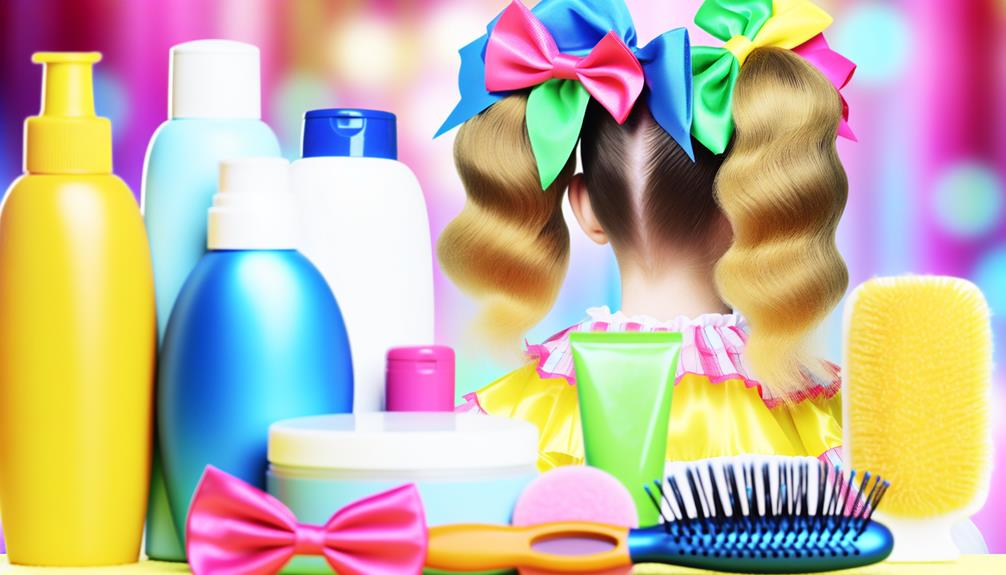JoJo Siwa's hairline may be influenced by several factors, including genetic predisposition, aggressive styling practices, and nutritional deficiencies. Conditions such as androgenetic alopecia can lead to inherited hair thinning. Additionally, tight hairstyles and heat damage can result in traction alopecia. Nutritional elements like biotin, vitamin D, and iron are essential for hair health; deficiencies can impair growth. Various treatment options, including medicated shampoos, laser therapy, and hair transplants, may address hair loss effectively. An informed and proactive approach to hair care is vital for maintaining hair health, and further insights into effective strategies await exploration.
Key Takeaways
- JoJo Siwa's hair health may be influenced by genetic factors, leading to potential hair thinning or loss over time.
- Aggressive styling practices, such as tight hairstyles and heat tools, can contribute to hair damage and traction alopecia.
- Nutritional deficiencies, particularly in biotin, vitamin D, and iron, can impair hair growth and overall density.
- Treatment options include medicated shampoos, hair transplants, and laser therapy to address various causes of hair loss.
- Engaging with a supportive community and sharing hair care tips can foster positive self-image and awareness around hair health.
Overview of Hair Loss
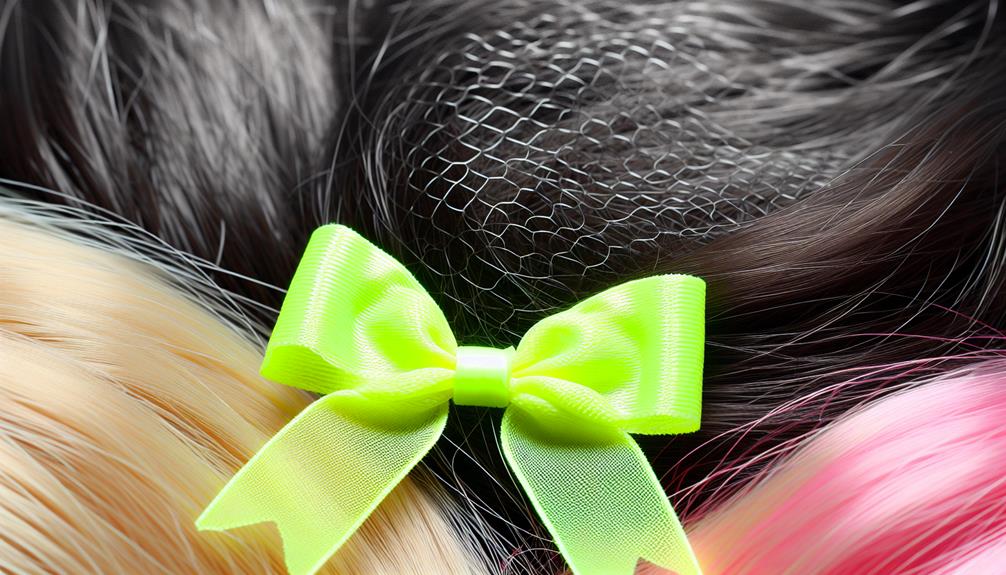
Hair loss is a commonly encountered condition that affects individuals across various demographics and age groups. The phenomenon can manifest in various forms, including androgenetic alopecia, alopecia areata, and telogen effluvium, each presenting distinct patterns and causes. While it is often perceived as a natural part of aging, hair loss can evoke significant emotional impact, leading to feelings of diminished self-esteem and identity for many affected individuals. Some celebrities, like Bruce Willis, have openly discussed their health journeys, including the impact of his medical condition on their appearance, which can resonate with those experiencing similar challenges.
The social stigma associated with hair loss further exacerbates these emotional challenges. Society often equates hair with youth and liveliness, creating a narrative that individuals experiencing hair loss may feel alienated from. This stigma can lead to withdrawal from social interactions and a reluctance to seek help, as individuals may fear judgment or misunderstanding from their peers.
Understanding the complexities of hair loss is essential in fostering a supportive environment for those affected. By acknowledging both the medical aspects and the psychological ramifications, we can promote awareness and empathy, helping individuals navigate their experiences with hair loss while fostering a sense of belonging in a society that often overlooks these issues.
Factors Contributing to Hair Loss
Various factors can greatly contribute to hair loss, including genetic predisposition, styling practices, and nutritional deficiencies. Genetic factors often dictate the likelihood of hair thinning or loss, while aggressive styling techniques can lead to mechanical damage and exacerbate the condition. Additionally, inadequate nutrition can impair hair growth, highlighting the importance of a balanced diet for maintaining healthy hair follicles. Utilizing effective tools for academic success, such as improved test preparation, can also help individuals understand the underlying issues related to hair health and loss.
Genetic Predisposition to Hair Loss
Genetic factors play a significant role in the development of hair loss, often setting the stage for conditions such as androgenetic alopecia. This hereditary condition, commonly known as male or female pattern baldness, is influenced by various genetic markers that can be inherited from one or both parents. The interplay of multiple genes contributes to the likelihood of experiencing hair thinning or loss, demonstrating the complexity of genetic predisposition.
Research indicates that specific hereditary traits, such as variations in the androgen receptor gene, can exacerbate the effects of hormones like dihydrotestosterone (DHT), leading to follicle miniaturization. This process results in progressively thinner hair strands and eventual cessation of hair production. Understanding these genetic underpinnings is essential for individuals seeking to comprehend their hair loss patterns and potential treatments.
Furthermore, the identification of genetic markers associated with hair loss can aid in personalized approaches to management. As awareness of genetic predisposition grows, individuals can better navigate options ranging from lifestyle modifications to medical interventions, fostering a sense of belonging within communities facing similar challenges. Ultimately, recognizing the hereditary nature of hair loss empowers individuals to take proactive steps in addressing their unique situations.
Styling Practices and Damage
Styling practices play an important role in the health of hair, with certain techniques contributing considerably to hair loss and damage. Among these, heat styling emerges as a significant factor. The frequent use of tools such as flat irons, curling wands, and blow dryers can weaken the hair shaft, leading to increased brittleness and breakage. Fundamentally, the high temperatures cause a breakdown of the protein structure within the hair, resulting in a compromised hairline and overall thinning.
Conversely, while protective styles are often touted as beneficial, they can also pose risks if not executed properly. Styles that pull tightly on the scalp, such as braids or ponytails, can lead to traction alopecia, a type of hair loss resulting from prolonged tension. It is vital to balance styling practices with care, ensuring that hair is not subjected to excessive strain over time.
To mitigate damage, individuals should adopt heat-free styling alternatives and prioritize gentler methods when employing protective styles. A mindful approach to hair care is important for maintaining hair health, fostering a sense of community among those who value both style and well-being.
Nutritional Deficiencies Impacting Growth
Nutritional deficiencies greatly undermine hair growth, leading to noticeable hair loss and compromised hair health. Essential vitamins and minerals play pivotal roles in maintaining the integrity of hair follicles and promoting healthy hair growth. Specifically, vitamin deficiencies, such as those of biotin, vitamin D, and iron, can greatly impact hair density and strength. For instance, biotin is critical for keratin production, while vitamin D is necessary for the hair growth cycle.
Moreover, inadequate mineral absorption, particularly of zinc and selenium, can exacerbate hair loss. Zinc is essential for cellular repair and regeneration, and its deficiency can lead to hair thinning and shedding. Selenium, on the other hand, helps protect hair follicles from oxidative stress.
In addition, a well-balanced diet rich in these nutrients is fundamental to not only hair health but overall well-being. Individuals experiencing hair loss may benefit from nutritional assessments to identify potential deficiencies. By addressing these dietary shortcomings, one can foster an environment conducive to hair regrowth and well-being, ultimately enhancing their sense of belonging and confidence in their appearance.
Genetic Influences on Hair Health
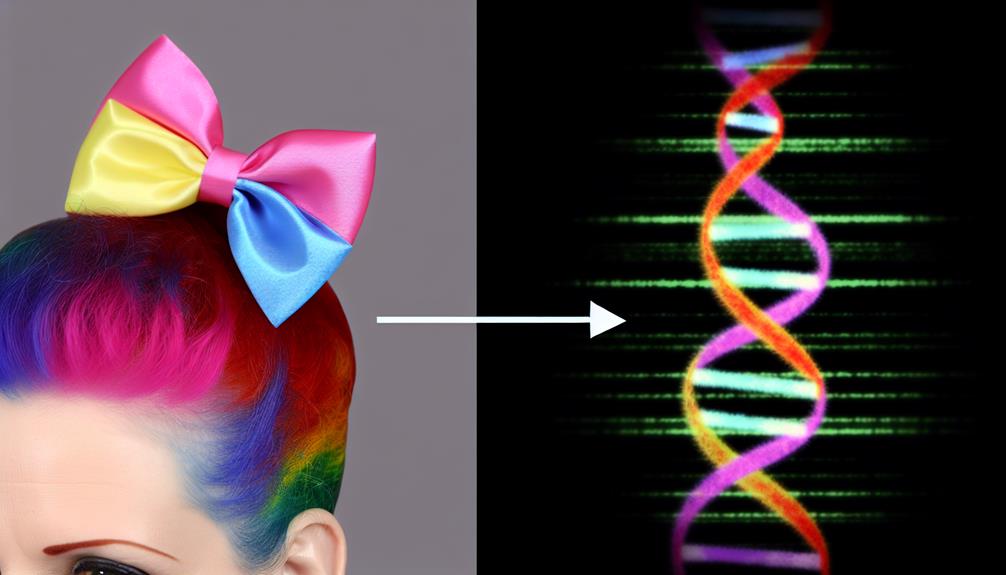
Genetic factors play a vital role in determining hair health, influencing both the onset and progression of hair loss. Family history often reveals patterns of hair thinning and baldness, suggesting a hereditary component that can affect individuals differently. For instance, innovations in genetic research have led to a better understanding of how specific genes contribute to hair loss, as seen in the banking industry's advancements. Understanding these genetic influences is essential for developing targeted treatment approaches for hair loss.
Hereditary Factors Impacting Hair
Understanding the hereditary factors that influence hair health is essential for addressing conditions such as hair loss. Hereditary traits play a crucial role in determining an individual's predisposition to various types of hair loss, particularly androgenetic alopecia, commonly known as male or female pattern baldness. Research indicates that genetic markers associated with hair follicle sensitivity to androgens can greatly influence hair thinning and loss.
Family genetics contribute to the expression of these markers, often leading to a predictable pattern of hair loss that can be observed across generations. This genetic influence is not limited to direct lineage; environmental factors may also interact with hereditary traits, exacerbating or mitigating the effects of genetic predisposition.
Moreover, advancements in genetic research have paved the way for identifying specific genes implicated in hair health. Understanding these genetic markers can facilitate early interventions and personalized treatment plans, enabling individuals to make informed decisions about their hair care and restoration options. Recognizing the interplay between hereditary factors and hair health fosters a sense of community among those affected, promoting awareness and support for those addressing similar challenges.
Family History and Patterns
Many individuals may find themselves reflecting on their family history when experiencing hair loss, as patterns of thinning or balding often reveal significant genetic influences. Hair genetics play an essential role in determining the likelihood of hair loss, with specific family traits frequently observed across generations. For instance, androgenetic alopecia, commonly known as male or female pattern baldness, is often inherited in a predictable manner, typically influenced by multiple genes.
Research indicates that both maternal and paternal lineage can contribute to hair loss, suggesting that family dynamics and genetic predispositions intertwine. Individuals noticing a receding hairline or thinning hair may benefit from evaluating their family history. Identifying relatives who have experienced similar issues can provide insights into potential future risks and inform proactive measures.
Understanding these hereditary patterns not only fosters a sense of belonging within familial contexts but also empowers individuals to seek appropriate interventions. By acknowledging the genetic aspects of hair health, individuals can engage in informed discussions with healthcare professionals, exploring treatments that align with their unique genetic profiles and family traits.
Styling Practices and Hair Damage
The impact of styling practices on hair health cannot be overstated, as certain techniques can lead to significant damage over time. Consistent use of heat styling tools, such as flat irons and curling wands, is a common contributor to heat damage. This type of damage manifests as dryness, brittleness, and breakage, ultimately compromising the integrity of the hair shaft. Additionally, incorporating knowledge about responsible product sourcing and brand ethics can influence choices in hair care products, particularly for those who prioritize support for ethical brands.
In contrast, protective styles, such as braids or updos, can serve to minimize exposure to environmental stressors and reduce manipulation, thereby promoting healthier hair retention. However, it is essential to execute these styles with care; overly tight hairstyles can lead to traction alopecia, a condition characterized by hair loss due to excessive pulling on the hair follicles.
Furthermore, the use of harsh hair care products in conjunction with these styling practices can exacerbate the risk of damage. Understanding the balance between aesthetic styling and the preservation of hair health is vital. By adopting mindful practices, individuals seeking to enhance their appearance while maintaining hair integrity can foster a sense of belonging within communities that value both beauty and wellness.
Health Conditions and Hair Thinning
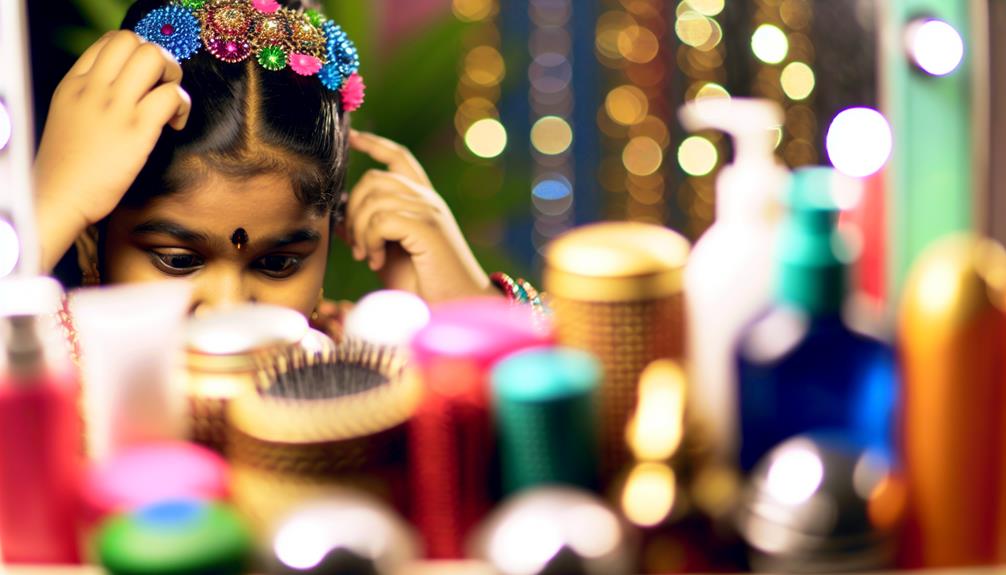
Hair thinning can be a distressing symptom often linked to various underlying health conditions. Among these, autoimmune disorders such as alopecia areata can greatly impact hair follicles, leading to patchy hair loss. In this condition, the immune system mistakenly attacks healthy hair cells, resulting in unpredictable thinning. Additionally, hormonal imbalances, particularly those associated with conditions like polycystic ovary syndrome (PCOS) or thyroid dysfunction, can disrupt the hair growth cycle. Elevated levels of androgens in PCOS, for instance, can lead to increased hair shedding and thinning over time.
It's essential for individuals experiencing hair thinning to recognize these potential health links, as addressing the underlying condition might alleviate the symptom of hair loss. Engaging with healthcare professionals can provide clarity and a tailored approach to manage these disorders effectively. Understanding the relationship between health conditions and hair thinning fosters a sense of belonging among those affected, as they realize they are not alone in their struggles. By seeking proper diagnosis and treatment, individuals can regain confidence and take proactive steps towards healthier hair and overall well-being.
Nutritional Impact on Hair Growth
Adequate nutrition plays an essential role in supporting ideal hair growth and maintaining a healthy scalp. The relationship between diet and hair health is significant, as certain hair nutrients are crucial in promoting growth and preventing hair loss. A deficiency in essential vitamins and minerals can adversely affect hair follicles, leading to thinning and loss.
The following table outlines key nutrients that contribute to hair growth, along with their sources and potential benefits:
| Nutrient | Sources | Benefits |
|---|---|---|
| Biotin | Eggs, nuts, legumes | Strengthens hair structure |
| Vitamin D | Fatty fish, fortified foods | Enhances hair follicle cycling |
| Zinc | Meat, shellfish, seeds | Supports protein synthesis |
| Iron | Spinach, lentils, red meat | Improves oxygen transport |
| Omega-3 Fatty Acids | Fish, flaxseeds, walnuts | Nourishes hair and scalp |
Incorporating these hair nutrients into one's diet, potentially alongside vitamin supplements, can foster a healthier environment for hair growth. By understanding the nutritional impact on hair, individuals can take proactive steps toward achieving and maintaining a vibrant hairline.
Treatment Options for Hair Loss
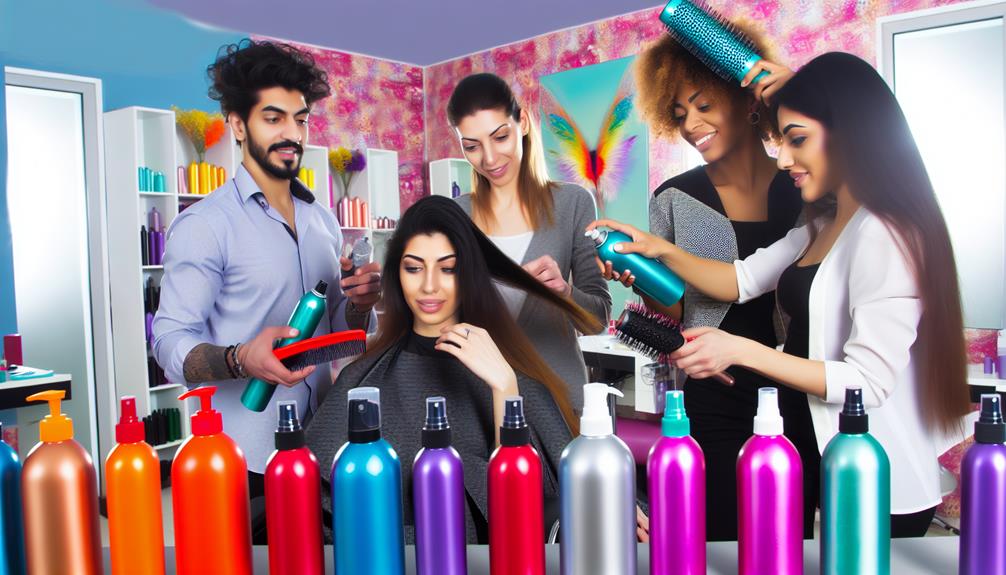
While various factors contribute to hair loss, including genetics, hormonal changes, and medical conditions, exploring effective treatment options is essential for individuals seeking to restore their hair. A range of therapies exists, each catering to different hair loss causes and personal preferences. For those dealing with health-related issues that may affect hair growth, accessing extensive healthcare services can provide valuable support, such as exploring healthcare services to address underlying conditions that contribute to hair loss.
Scalp treatments, such as medicated shampoos, can help address underlying scalp issues. For those seeking more permanent solutions, hair transplants offer a surgical option that involves relocating hair follicles from donor areas to thinning spots. Additionally, laser therapy has emerged as a non-invasive method to stimulate hair growth by enhancing blood circulation to the scalp.
Natural approaches, including herbal remedies and essential oils, are popular among individuals preferring holistic options. These can be combined with topical solutions designed to promote hair health. PRP therapy, or Platelet-Rich Plasma therapy, utilizes the body's own growth factors to stimulate hair follicles, presenting a promising avenue for restoration.
Furthermore, dietary supplements can support overall hair health, ensuring the body receives essential nutrients. By exploring these diverse treatment options, individuals can find a tailored approach that resonates with their needs, fostering a sense of community and belonging in their journey toward renewed confidence.
JoJo Siwa's Hair Care Routine
JoJo Siwa's hair care routine exemplifies a meticulous approach to maintaining the health and vibrancy of her signature locks. Her regimen is characterized by a strategic blend of protective styling, nourishing treatments, and the use of quality hair products. Siwa emphasizes the importance of regular washing, typically opting for gentle shampoos that do not strip her hair of essential oils.
Incorporating deep conditioning treatments into her routine is essential for hydration and elasticity, which are critical for preventing breakage. JoJo's styling tips include using heat protectants before styling, as excessive heat can lead to damage, especially for those with long hair. Additionally, she advocates for the use of satin or silk pillowcases to minimize friction during sleep, further protecting her tresses.
Siwa's product recommendations often highlight sulfate-free shampoos and silicone-based serums that enhance shine without weighing down hair. This thorough approach not only promotes hair health but also guarantees that her vibrant hairstyles remain a defining feature of her public persona. By sharing her hair care practices, JoJo fosters a sense of community among her followers, encouraging them to embrace their unique hair journeys.
Frequently Asked Questions
Can Hair Loss Affect People of All Ages?
Hair loss can indeed affect individuals across all age groups, influenced by a variety of factors. Genetic factors often play a significant role, while hormonal changes, particularly during puberty or menopause, can exacerbate the condition. Additionally, nutritional deficiencies, scalp conditions, and certain medical conditions contribute to hair thinning. Environmental influences, such as stress and pollution, may also impact hair health. Understanding these variables is essential for effective prevention and treatment strategies.
Are There Natural Remedies for Hair Thinning?
Natural remedies for hair thinning have gained attention for their potential effectiveness. Essential oils, such as rosemary and peppermint, have been shown to promote hair growth and improve scalp health when used in conjunction with scalp massages. Additionally, dietary supplements, including biotin and omega-3 fatty acids, may support hair health by nourishing hair follicles. While these remedies may offer benefits, individual results can vary, and consultation with a healthcare professional is advisable for personalized recommendations.
How Can Stress Impact Hair Health?
Stress considerably impacts hair health by triggering physiological changes in the body. Elevated cortisol levels, a response to stress, can disrupt the hair growth cycle, leading to conditions such as telogen effluvium. This phenomenon can result in increased hair shedding and thinning. Additionally, chronic stress may exacerbate underlying genetic predispositions to hair loss. Understanding the relationship between stress and hair health is essential for developing effective management strategies and fostering a sense of community support.
Does Hair Loss Affect Self-Esteem?
Hair loss can greatly impact self-esteem, leading to self-image struggles for many individuals. The visible changes associated with hair loss can create feelings of inadequacy and diminish confidence. This may result in social withdrawal or avoidance of activities, further exacerbating emotional distress. Conversely, addressing hair loss through effective treatments can provide a confidence boost, fostering a renewed sense of identity and belonging. Ultimately, the psychological effects of hair loss underscore the importance of self-care and support.
What Role Does Hydration Play in Hair Growth?
Hydration plays a critical role in hair growth, as it directly impacts scalp moisture and overall hair health. Adequate hydration benefits the scalp by maintaining its elasticity and preventing dryness, which can lead to irritation or flakiness. Additionally, well-hydrated hair follicles are more likely to produce strong, resilient strands. Consequently, ensuring proper fluid intake and utilizing hydrating hair products can greatly enhance hair vitality and support ideal growth conditions.

